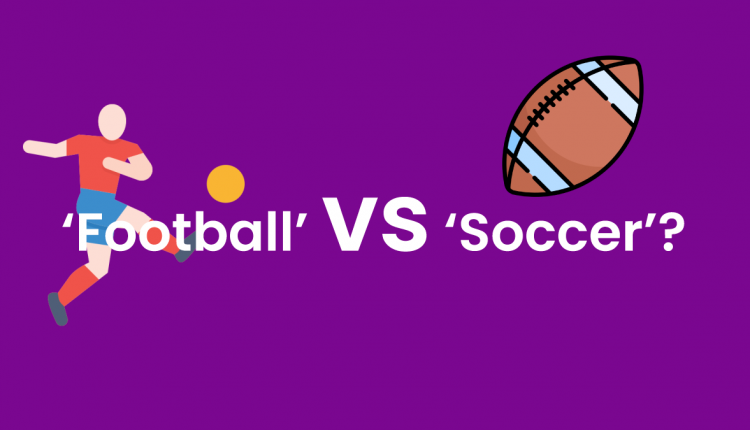Why do Brits and Americans argue about ‘football’ vs ‘soccer’? It seems like a simple matter of words, yet this debate stirs endless jokes, memes, and heated online arguments. In the UK and most of the world, “football” refers to the global game governed by FIFA—the sport played with a round ball and known for the World Cup. In the United States, however, “football” means the NFL, Super Bowl Sundays, helmets, and touchdowns. To avoid confusion, Americans use “soccer” when talking about the world’s game. What started as a harmless difference in terminology has evolved into a cultural tug-of-war that symbolizes national identity, pride, and a bit of playful rivalry.
This article explores the history of these terms, why the divide persists, and why fans on both sides of the Atlantic seem to enjoy poking fun at each other about it.
The Origins of the Word “Soccer”
Ironically, the word “soccer” actually originated in England. In the late 1800s, two versions of football were popular at universities: Rugby Football and Association Football. To shorten the name of “Association Football,” students at Oxford coined the slang term “assoc,” which later morphed into “soccer.” At the same time, “rugger” was slang for rugby. For years, “soccer” and “football” were used interchangeably in the UK, with newspapers often preferring “soccer.”
It wasn’t until much later, particularly in the 20th century, that “soccer” fell out of favor in Britain, while in the United States it stuck as the go-to term to distinguish the sport from American football.
Why Americans Use “Soccer”
In the U.S., “football” had already taken root as the name for the gridiron game that evolved from rugby in the late 19th century. Since both sports shared the word “football,” Americans used “soccer” to avoid confusion. By the time the NFL exploded in popularity, “soccer” was firmly entrenched in American English.
For American fans, the term simply makes sense. It separates their national sport—football—from the international version. Without the distinction, conversations would become chaotic: “Are you talking about the Patriots or Manchester United?”
Why Brits Insist on “Football”
For Brits, “football” is the name of the world’s game. It’s not just a sport—it’s cultural identity. The Premier League, the FA Cup, and centuries of tradition are wrapped up in the word. To them, calling it “soccer” feels unnecessary, even disrespectful. Many argue, “You play football with your feet, so of course it’s football.”
Over time, rejecting the word “soccer” became a way for Brits to reinforce that cultural pride and distinguish their game from America’s version.
Why the Debate Persists
The argument over “football” vs “soccer” continues because it’s more than a word—it’s a playful culture clash. Brits often joke about Americans “stealing” the word football, while Americans tease Brits about their sensitivity over terminology. The rise of social media has turned this into a meme war, with every World Cup or Super Bowl reigniting the discussion.
At its core, the debate is fueled by national pride. Football is the global game; soccer is the American label. Neither side is wrong—the words simply evolved differently in each country—but the clash has become part of the fun of sports banter.
Global Usage of “Soccer”
Interestingly, it’s not only Americans who use “soccer.” Countries like Canada, Australia, New Zealand, and even South Africa commonly use the word, often because they also have popular versions of rugby or American football-style games. This shows that “soccer” isn’t just an American invention—it’s a global variation based on context.
The Media and Pop Culture Factor
Pop culture has helped fuel the divide. British tabloids mock Americans for “not understanding football,” while U.S. broadcasts proudly market “soccer” when covering the World Cup. Movies, memes, and even video games like FIFA vs. Madden further highlight the difference. Every time international fans clash online—say, during the World Cup or NFL season—the terminology debate resurfaces.
Does It Really Matter?
At the end of the day, both sides are talking about the same beautiful game. The only difference is linguistic and cultural context. But because sports are tied to national identity, the terminology feels important. Arguing about “football” vs “soccer” has become a tradition in itself, part of the cultural exchange between two nations with very different sporting priorities.
More Than Just Semantics
So, Why do Brits and Americans argue about ‘football’ vs ‘soccer’? Because the words carry history, culture, and pride. Britain gave the world both terms but reclaimed “football” as its identity, while the U.S. embraced “soccer” to distinguish it from its own beloved game. Neither side is truly wrong, but the debate persists because it represents something bigger than sports—it’s a friendly rivalry between two nations divided by a common language and united by a love of competition.

